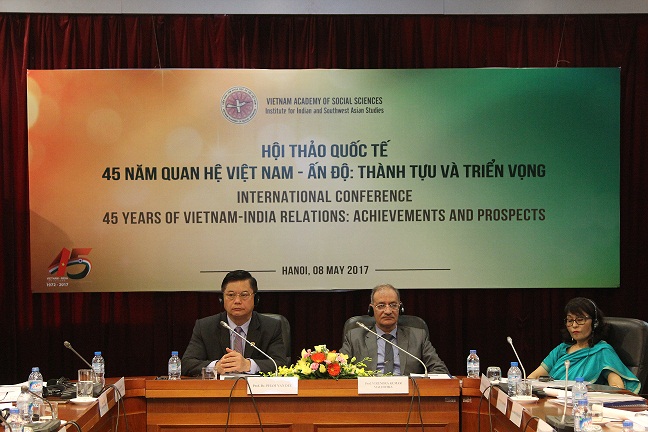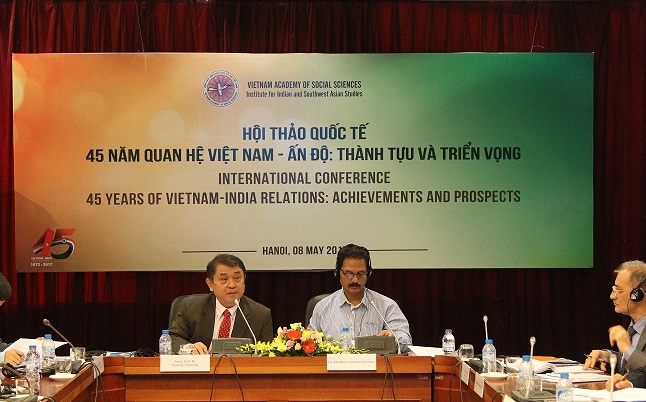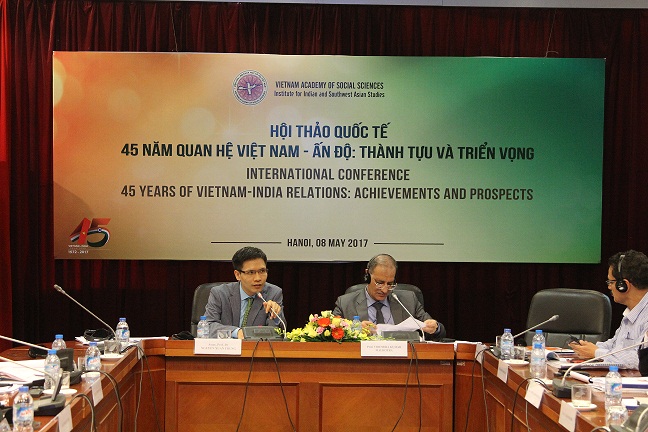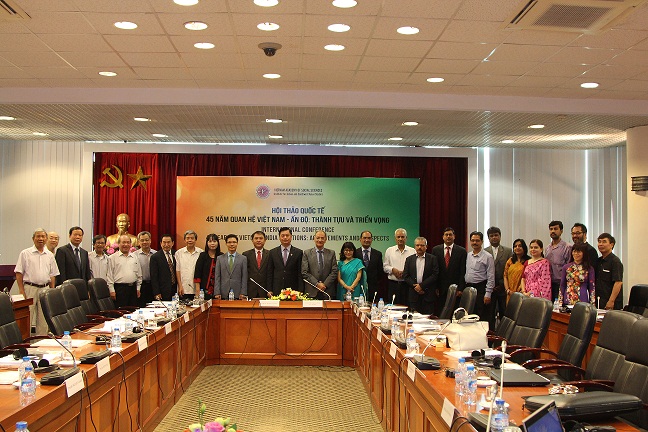Attending the workshop, on the Indian side, were Ms. Nina Tshering La, chargé d'affaires of Embassy of the Republic of India in Vietnam; Professor Virendra Kumar Malhotra - Permanent Secretary, Indian Council for Social Science Research (ICSSR), ICSSR’s staff and representatives from various academic institutions and universities in India. On the Vietnamese side: Prof.Dr. Pham Van Duc, Vice President of the Academy; Assoc.Prof.Dr. Nguyen Xuan Trung, Director of Institute for India and Southwest Asian Studies; Assoc.Prof.Dr. Ngo Xuan Binh, editor-in-chief of the Indian and Asian Studies Review, former director of the Institute for India and Southwest Asian Studies and delegates from the Center for Indian Studies, Ho Chi Minh National Academy of Politics and Public Administration (HCMA); Vietnam-India Friendship Association; University of Social Sciences and Humanities, Hanoi National University; University of Social Sciences and Humanities under National University of Ho Chi Minh City; Hanoi National University of Education; Thu Dau Mot University of Binh Duong; Diplomatic Academy of Vietnam, Communist Party of Vietnam international Commission; The Institute for International Relations in Defense Studies, together with representatives of functional departments, specialized research institutes under the Academy and researchers from the Institute for India and Southwest Asian Studies.
|

|
The relationship between Vietnam and India is a traditional, friendly relationship. It is a special relationship based on trust, mutual understanding and sharing of the benefits and history of commercial, cultural and religious exchanges for thousands of years.
Indian Prime Minister Narendra Modi's visit to Vietnam in September 2016 marked a new development step, upgrading the bilateral relationship from a strategic partnership to a comprehensive strategic partnership, becoming one of the three comprehensive strategic partners of Vietnam besides Russia and China. Therefore, the promotion of a comprehensive strategic partnership between the two countries will bring about practical benefits for both sides in the socio-economic and social development as well as affirming the position of each country in the region and in the world.
By the Opening speech at the Workshop, on behalf of the Academic Leadership, Prof.Dr. Pham Van Duc warmly welcomed the presence of the participants, at the same time, he also affirmed the significance of the workshop in the context of the two countries celebrating 45 years of diplomatic relations establishment, 10 years of establishing strategic partnership and 1 year of establishing a comprehensive strategic partnership. Thereby, the Vice President of the Academy stated the purpose of the workshop was to review and evaluate the achievements and limitations of the 45 years of Vietnam-India relations and the prospects of cooperation in the coming years; To make proposals and recommendations to boost the Vietnam-India relations to develop stronger and more effective; Promote partnerships between the Academy and its affiliated units with research institutes and universities in India.
In addition, Prof.Dr. Pham Van Duc proposed some contents of the workshop should focus on discussion:
1. Factors affecting the relations between Vietnam and India: changes in the regional and global context, the situation of India, Vietnam and foreign policy of each country.
2. The status of relations between Vietnam and India since the two countries established full diplomatic relations in 1972 in the fields of politics and diplomacy; economy; security - defense; culture, education; Technology…
3. Assess the achievements and limitations in the Vietnam-India relations in all areas.
4. Analysing and evaluating regional security architecture: Vietnam - India
5. Forecast development trends, prospects for cooperation, make recommendations to promote effective cooperation between Vietnam and India in the coming years.
In the welcome speech, on behalf of the Embassy of India in Vietnam, Ms. Nina Tshering La expressed her pleasure and respect to the achievements in bilateral relations between the two countries over the past time; She affirmed that the exchange of traditional ideas and values were forms of effective cooperation that strongly promotes the Vietnam-India relationship (socio-economic cooperation).
Based on reviewing the history of bilateral cooperation between the two countries on fields (of economy, culture-society, medical, science and technology, defense-security) and the prospect of renewable energy cooperation between the two countries, Ms. Nina Tshering La highly appreciated the important role of Vietnam - the liaison between India and ASEAN; thereby, emphasizing the deep trust and confidence that were important to the achievements made in the strategic partnership between the two countries. Therefore, the two sides should bring into full play their potentials and strengths through close exchanges and cooperation.
Also in the Welcome speech, Prof. Virendra Kumar Malhotra emphasized that Vietnam-India have established a long-standing cultural and religious cooperation and good people exchange, especially academic cooperation. He also affirmed that Vietnam was an important factor in India's eastward policy; highly appreciated the prospects of cooperation between the two countries and Southeast Asia; Desired, achievements and outcomes of the India-Vietnam relationship would be exchanged and discussed through the workshop, thereby contributing to the development of the two countries' relations to new heights.
 |
Speaking at the seminar, Assoc.Prof.Dr. Nguyen Xuan Trung affirmed that the relationship between Vietnam and India has developed well during the last 45 years; at the same time highlighting the achievements in the fields of politics, security, people exchange and tourism development. Assoc.Prof.Dr. Nguyen Xuan Trung also pointed out the limitations in bilateral relations, especially economic relations, which analyzed and set out a number of theories on the causes of restriction of relations between Vietnam and India. Assoc.Prof.Dr. Nguyen Xuan Trung also said that in order to develop bilateral relations, the two sides needed to deepen mutual understanding in order to seek opportunities for cooperation from such difficulties as well as promote the role of state support; Expressed confidence in the future of the two countries' relationship would grow stronger day by day.
 |
|
 |
The workshop received 30 presentations, of which 11 were presented, divided into 2 sessions, focusing on two main topics:
Session 1: General issues, Vietnam-India relations and influencing factors (Mr. Pham Sy Tam, former Vietnamese ambassador to India, Assistant Professor Tilottama Mukherjee, Dean of Political Science, Calcutta University, Kolkata; Prof. Beena Narayan, Head of IES Management and Research Center, Mumbai, Assoc.Prof.Dr. Do Thu Ha, University of Social Sciences and Humanities). Session 2: Vietnam-India Relations: Achievements and Prospects, (Prof. Ganganath Jha, Jawaharlal Nehru University, Admiral Abhay Kumar Singh, Institute for Defense Studies and Analysis, Prof. B.V. Muralidhar, Sri Venkateshwara University, Tirupati, MA Nguyen Ha Trang, Thu Dau Mot University, Binh Duong, Dr. Le Thi Hang Nga, Institute of Indian and Southwest Asian Studies), along with 10 questions and comments that have been set out, that have broadened the main points in the India-Vietnam relationship over the past 45 years and analyzed the prospects for diplomatic relations of the two countries in the coming time.
 |
The contents of the speeches highlighted many important issues in the bilateral relationship between the two countries (economic and trade relations, cooperation in the fields of education, human resources training...); exchanged of maritime security environment in West India and the Pacific (challenges and prospects); Indicated the results achieved and the constraints in bilateral cooperation, thereby promoting the role of India and Vietnam in establishing bilateral relations. In addition, the report proposed important suggestions for finding ways, directions and solutions to promote bilateral relations. The discussions and discussions at the workshop provided useful suggestions for further researches, created the voice of the scientific community and valuable reference for key decision makers.
The workshop was a useful scientific forum for Vietnamese and Indian researchers to share information, materials, opinions and multi-dimensional perspective on the special relationship between Vietnam and India. The analysis and evaluation of the scientists will provide more comprehensive and deeper insight into the relationship between Vietnam and India, thereby suggesting useful ideas and solutions for the effective implementation of the cooperation plan between the two countries in future time.
Nguyen Thu Trang







